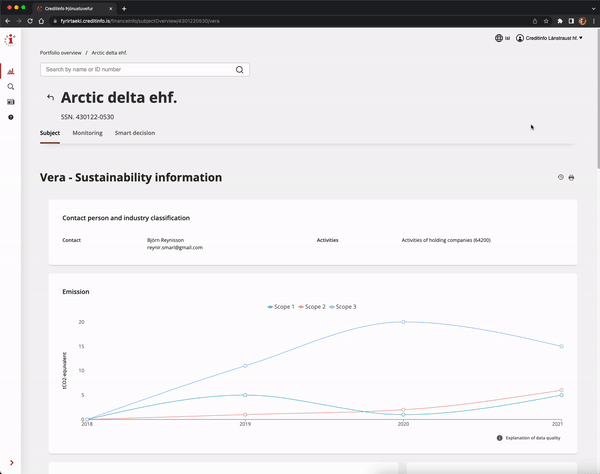“Vera”, Creditinfo’s ESG platform, now available for customers in Iceland

Environmental, social, and governance (ESG) factors are increasingly becoming a key consideration for investors, stakeholders, and companies. These factors help measure the sustainability and societal impact of a business, and ESG data is crucial for decision-making in the investment and corporate world. However, the availability, quality, and accessibility of ESG data have been major challenges, making it difficult to obtain accurate and reliable insights. This is increasingly becoming a problem for small and medium sized businesses that do not have the resources available to access and produce accurate and reliable ESG data.
To address this growing need for ESG data services Creditinfo Iceland recently launched Vera, a new ESG data platform, for customers in Iceland. With Vera companies can access data about their customers and/or suppliers in an accessible way. The platform contains diverse sustainability information for all active companies in Iceland including data directly reported by companies as well as external sources such as media coverage, judicial information, and supply chain operations. Companies can easily update their own sustainability information through MyCreditinfo to ensure an accurate portrayal of information such as emissions, ESG ratings, and other relevant data.
What are the features Vera has to offer?

- Who can update sustainability information?
One of Vera characteristics is that much the data can be updated to increase accuracy. If a company has a dedicated in-house sustainability officer, this person can be given access to Vera to update its info. This is done through MyCreditinfo where anyone inside the company with edit access can forward the access to a relevant employee. The sustainability officer can then provide the needed input.
- Contact person
Sometimes it is difficult to reach the relevant person within companies regarding sustainability. This can happen during supplier assessments or during other processes where sustainability data is needed. It can also be time consuming to figure out who is responsible for this subject within companies. Vera helps with this process by offering companies to clarify who is the responsible person for sustainability related matters. This makes all communications easier and data flow quicker.
- Greenhouse gas emissions
Most companies are accountable for greenhouse gas emissions, either directly or indirectly. Some companies know how much is emitted and where. Vera can estimate the greenhouse gas emissions from company operations if she knows the industry companies operate in and their revenue. This data must be in place in order for Vera to run its calculations. If companies know however their emissions, they can update their profile to provide better information to the market.
- Emission intensity
Absolute greenhouse gas emissions tell a certain story regarding company operations. However, companies can emit the same amount of greenhouse gases while their size may differ. So understanding how much is emitted per revenue provides a better understanding of the sector. Emission intensity of the sector is therefore also a very relevant metric. Vera provides its users with an overview of the carbon intensity of the sector companies operate in. Sector emission intensity can initiate an interesting conversation between a lender/investor and the company where the company may want to demonstrate a better performance than the sector as a whole. Vera provides the sector carbon intensity on a scale which is easy to read and understand.
- Sustainability risks and opportunities
Sustainability risks vary between sectors. Material sustainability factors are those who may have financial implications on companies if mismanaged. Sustainability accounting standards board (SASB) which is now a part of the IFRS has defined which sustainability factors are material within sectors and why. Such an overview is important for companies in order to manage material factors instead of using resources to provide data on non-material factors.
Vera uses data from SASB to provide its users with an overview of material factors for individual companies and if the factors are considered climate risks. If a sustainability risk is classified as climate risk, Vera indicates the type of climate risk. This can be physical or transitional. Physical risks appear for example through extreme weather, ocean acidification etc. Transition risks appear through policy and legal risks. Vera provides an understanding regarding which sustainability risks companies are exposed to in a convenient manner.
- Sustainability in the value chain
Using public data it is possible to map out the international supply chain of sectors. Vera provides such overview but is clear regarding the pitfalls of the data as the sector does not represent individual companies. Companies can therefore update their supply chain data. By updating the data in Vera, companies gain a deeper insight into various sustainability related matter in their value chain.
Users of Vera can click on the value chain countries and redirect to the UN SDG website where even more detailed data is provided. In this way, the users of Vera and the reporting companies get a much better overview of the possible risk factors in the supply chain.
- Sustainability media information
Creditinfo maintains a media monitoring service in many of its markets. Using the data from Creditinfo, it is possible to monitor ESG related news articles involving individual companies. The ESG media monitor only monitors ESG related articles. Vera therefore utilizes the media quite effectively as a watchdog. Vera also provides ESG related media coverage regarding companies within the same sector.
- Sustainability media information in the supply chain
Vera understands which countries the sector mostly does business with. Using this data, Vera can monitor ESG related matters in the countries the company mostly does business with. If a company provides better data regarding its value chain, they have the possibility to understand better on a macro level the operating conditions in those countries. Such data can be used for decision making and supplier assessments.
- Sustainability documents
Companies often publish reports and documents related to sustainability. This data is often dispersed around their website and is time consuming to maintain in a single place. Companies may also have various certifications in place which they may want to put forward. Such reports can be uploaded to Vera, which makes their access easier. If a company does not upload its reports to Vera, Creditinfo staff manually gathers the data and uploads to Vera.
- Court cases
Vera provides an overview of court cases the company appears in for all court levels. It is possible to see the case abstract only or navigate to the official court document online. Vera also shows court cases for parent companies and subsidiaries. The ratio of ownership has to be 10% or more in both directions for Vera to show the cases. Vera therefore provides a better insight into related cases than the courts themselves.
- Diversity information
Diversity in management and staff is an important component of successful companies. Studies have shown that gender diversity in staff has a positive impact on companies. Vera offers information about gender ratios for employees, board members and executives for a company. This information can be updated via MyCreditinfo.
For more information visit www.creditinfo.com
Hrefna Ösp appointed new CEO of Creditinfo Iceland

Press Release
LONDON, UK, 23rd September, 2021
Hrefna Ösp Sigfinnsdóttir has been appointed as the new CEO of Creditinfo Iceland. She previously held the position of Managing Director of Asset Management and Brokerage at Landsbankinn. She has over 27 years of experience in the finance industry and will bring her wealth of knowledge and expertise to Creditinfo Iceland and the company at large.
‘We warmly welcome Hrefna Ösp to work and we are very happy to have her join us. Hrefna has extensive experience and a clear vision of the functioning of financial markets, which will be a major driver in moving Creditinfo’s journey forward. Hrefna joins a team of highly motivated staff who are also excited to have her on board’ says Paul Randall, CEO of Creditinfo Group.
“I am especially excited to join Creditinfo. I have followed the company since its establishment and have been a loyal customer. I know that Creditinfo has a very strong team that provides excellent service with powerful solutions. It is exciting to become part of an international ecosystem such as Creditinfo Group which is widespread throughout four continents, I foresee many growth opportunities for me as a professional and Creditinfo Iceland as a team. I am especially keen to further develop and provide solutions the market needs, such as open banking and increased demand for knowledge of customers and the origin of capital” says Hrefna Ösp.
Hrefna holds a Degree in Business Administration from the University of Iceland and a certification exam in securities trading.
She resigned from Landsbankinn this autumn after having been there since 2010. Before that, she worked as a fund manager at Arev Securities Company from 2007. She also worked as the Director of the Listing Division and as an expert on the same at the Iceland Stock Exchange from 1998-2006. Hrefna previously worked as the Director of Personal Services at Fjárvangur and was also an employee of the Central Bank of Iceland’s Monetary Policy Department.
Hrefna has also served on the boards of several companies both in Iceland and abroad and is also one of the founding members of IcelandSIF, an independent forum for discussion and education on responsible and sustainable investments.
The Creditinfo Team welcomes Hrefna and is looking forward to start collaborating with her.
PR contacts:
Caterina Ponsicchi,
Marketing Director,




